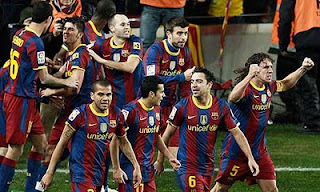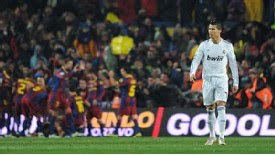
Many dubbed it the biggest club game in football history. With 209 meetings between the two sides that represent the political and cultural dichotomy prevalent throughout much of Spain, thirteen world champions on hand, the two most recent Ballon d'Or winners and the three most recent top scorers in the UEFA Champions League present, one club being just two points ahead of the other atop La Liga, and it being the most watched club football game on the planet other than the UEFA Champions League Final, the historic rivalry between Barcelona and Real Madrid had seldom received this much hype and buildup or felt more important.
Then came Monday night.
A cold, damp evening on the sodden pitch of the Nou Camp saw the 210th meeting between these two hated foes turn into a massacre of (somewhat) unexpected proportions as Barcelona thrashed visiting Real Madrid 5-0 to leapfrog Los Blancos and take the wheel as league leaders in Spain’s top-flight division.
We all know what happened, and in the aftermath of the destruction, as is typical in any big showdown between two heavyweights, pundits across the globe have been putting pen to paper (that expression is obsolete, but so be it) to tell their respective tales and opine about the more surprising storyline: Barça’s romp or Real’s whomp.
Ever since I was hired and agreed to come teach in Spain for a year at the end of this past spring, I had been looking forward to this match. Having only been to Barcelona once before when I was nine (and having partied a little too hard to remember it, apparently), I had planned on journeying up to Catalunya for the weekend and shelling out however many Euros it would take to get me inside Europe’s largest stadium to feast my eyes on the greatest rivalry in all of sports.
Let’s just say a weekend trip to Lisbon proved to be a bit less expensive than my venture to BCN might have been, and I figured since I’d be flying back from Cristiano Ronaldo’s former home to his new home, I’d still be able to catch some of the action on television in the Spanish capital.
Wrong again.
My bus from Madrid to Granada was scheduled to depart at 7:30 and arrive in Andalucía just after midnight, meaning I’d miss what was supposed to be the most exciting Clásico yet. My only hope was for my bus’s thirty-minute break to coincide with a piece of the action.
Luckily, it did.
The trip was one of the rockiest I had ever experienced via coach in my twenty-three years of existence, the light fixture above me that I needed to write things down was out, and my BlackBerry’s 3G network was having serious problems picking up a signal for most of the ride, but ultimately I managed to discover that Xavi and Pedro had found the back of the net and were sitting pretty at halftime 2-0 over Real. About fifteen minutes later the bus stopped. I walked into the bar and ordered a bocadillo de jamon y queso just as the second half was getting underway.

It didn’t take long for Barça to add insult to injury with a pair of David Villa strikes in the 55th and 58th minutes that doubled the home side’s lead over their rivals, who were lost in a sea of bewilderment and consternation. It was after the former Valencia forward’s second goal when I swallowed my last bite of baguette, cured meat, and olive oil, and headed back to the bus with several minutes to spare before the bus resumed its journey; I didn’t need to see anymore.
It should be noted that I am not a Real Madrid fan, so it’s not as if my emotions had been severely damaged by what I had just witnessed. To be fair, I appreciate the way Barcelona play, but am also a big fan of José Mourinho, the man in charge of the Catalan club’s most threatening opposition.
No, I left the bar because what I had seen in those three minutes had demonstrated to me what most of us already know: that football is a team game, and therefore, you win as a team.
One need only to have watched (or, eh-hem, seen the highlights of) Barcelona’s celebration after Xavi flicked the ball past Iker Casillas in the tenth minute for the game’s opening goal that sent the Nou Camp faithful into a thunderous uproar to confirm this notion, and catch a glimpse of Barcelona’s team-oriented mentality. After the talismanic midfielder ran wild down the goal line, there were no fewer than seven of his teammates in-tow, each one of them eager to pounce on their revered goal-scorer.
Barcelona’s possessive and meticulous style of play sold itself on this point. Intricate passing, perfectly-weighted through-balls, timely runs, composed finishing, and selfless play in general led to the demolition of (historically) Europe’s most successful club—their first defeat of the season and first under Mourinho, who was making his first return to the Nou Camp since April when he oversaw a defiant second-leg loss with Inter that still propelled the eventual champions to the UCL Final in Madrid 3-2 on aggregate.
After watching Barcelona’s bedazzling performance on Monday night, there will be many who will wonder exactly how Mourinho’s former squad managed to thwart the brilliant, disciplined tactical machine that is Pep Guardiola’s band of radiant technicians last season.
To be sure, the Special One’s new club most certainly does not lack quality. In fact, they still may be one of, if not the second-best team in Europe. But that term—team—is an ironic one for Real Madrid, because while they are one by default, it is clear that they are still light-years behind their rivals in instilling that team-first mentality on which Barcelona so prosperously thrives.
Mourinho clearly felt similarly, declaring in a post-match interview: “Barça is the finished article while Madrid is still a long way off that.”
The most telling tally in Barça’s emphatic destruction of Real on Monday night, however, must have been substitute Jeffrén Suárez’s stoppage time tap-in. A low cross from fellow sub Bojan Krkić to the Venezuelan-born winger, who slipped it past Casillas for the fifth and final goal of the evening, proved once again that at a club as great as Barcelona, even those players who are restricted to making mere cameo appearances are capable of on-pitch success thanks to the club’s seemingly impregnable tactical system.

For me, the current rivalry between these two clubs, which has now seen Barcelona capture five wins in the last five Clásicos, draws a curiously strong comparison to that of the Patriots and the Colts of the NFL—most notably during New England’s Super Bowl-winning years. It was the system employed by head coach Bill Belichick that enabled players like David Givens, Randall Gay, and even Randy Moss et al to maximize their talents and in turn help the team win game after game after game as a unit, while the Colts relied too heavily on quarterback Peyton Manning to do something about it (I’ll let you venture a wild guess as to which Real Madrid player is most closely associated with the four-time NFL MVP).
Granted, the Colts eventually found a formula that worked against the Patriots, and all of a sudden, they started winning games over their heated enemies. But will Real Madrid find a similar formula that enables them to finally return the favor and begin to conquer their now superior rivals once more?
Only time will tell as the next edition of this storied rivalry is slated for April, and Real will likely be playing catch-up until that point. There is of course no way of knowing where in the table Real and Barça will be come that date, but here is some parting advice for the future of Mourinho’s men in white when it comes to jousting with their neighbors from the northeast: invest more in an on-field philosophy based on tactics and teamwork as opposed to an off-field philosophy based on club President Florentino Pérez’s checkbook; it hasn’t won them a Clásico (much less a title) since it was activated...again.








 We know the rest of the story. Manager José Mourinho’s ingenuity ultimately prevailed when he brought on out of favor striker Karim Benzema for Gonzalo Higuaín, and then new boy Pedro León. Moments into stoppage time the former fed the latter with an exquisite pass that the former Getafe star put through Milan goalkeeper Christian Abbiati’s wickets and all lapses were suddenly forgotten. The Special One then celebrated lavishly, as only he knows how, running jubilantly down the sideline to laud his goal-scorer as his club made certain they would be playing European football come February.
We know the rest of the story. Manager José Mourinho’s ingenuity ultimately prevailed when he brought on out of favor striker Karim Benzema for Gonzalo Higuaín, and then new boy Pedro León. Moments into stoppage time the former fed the latter with an exquisite pass that the former Getafe star put through Milan goalkeeper Christian Abbiati’s wickets and all lapses were suddenly forgotten. The Special One then celebrated lavishly, as only he knows how, running jubilantly down the sideline to laud his goal-scorer as his club made certain they would be playing European football come February.  We must remember that the 2-2 draw against Milan was only one game, and that may not be enough to raise concern for future fixtures. However, if Real fails to progress past the first round of the knockout stages once again, we may find that Wednesday night’s clash was a subtle preview of things to come for Mourinho’s men in white. Again, the design is there for the world’s greatest manager, it’s just whether or not the architect has the proper materials at his disposal.
We must remember that the 2-2 draw against Milan was only one game, and that may not be enough to raise concern for future fixtures. However, if Real fails to progress past the first round of the knockout stages once again, we may find that Wednesday night’s clash was a subtle preview of things to come for Mourinho’s men in white. Again, the design is there for the world’s greatest manager, it’s just whether or not the architect has the proper materials at his disposal.